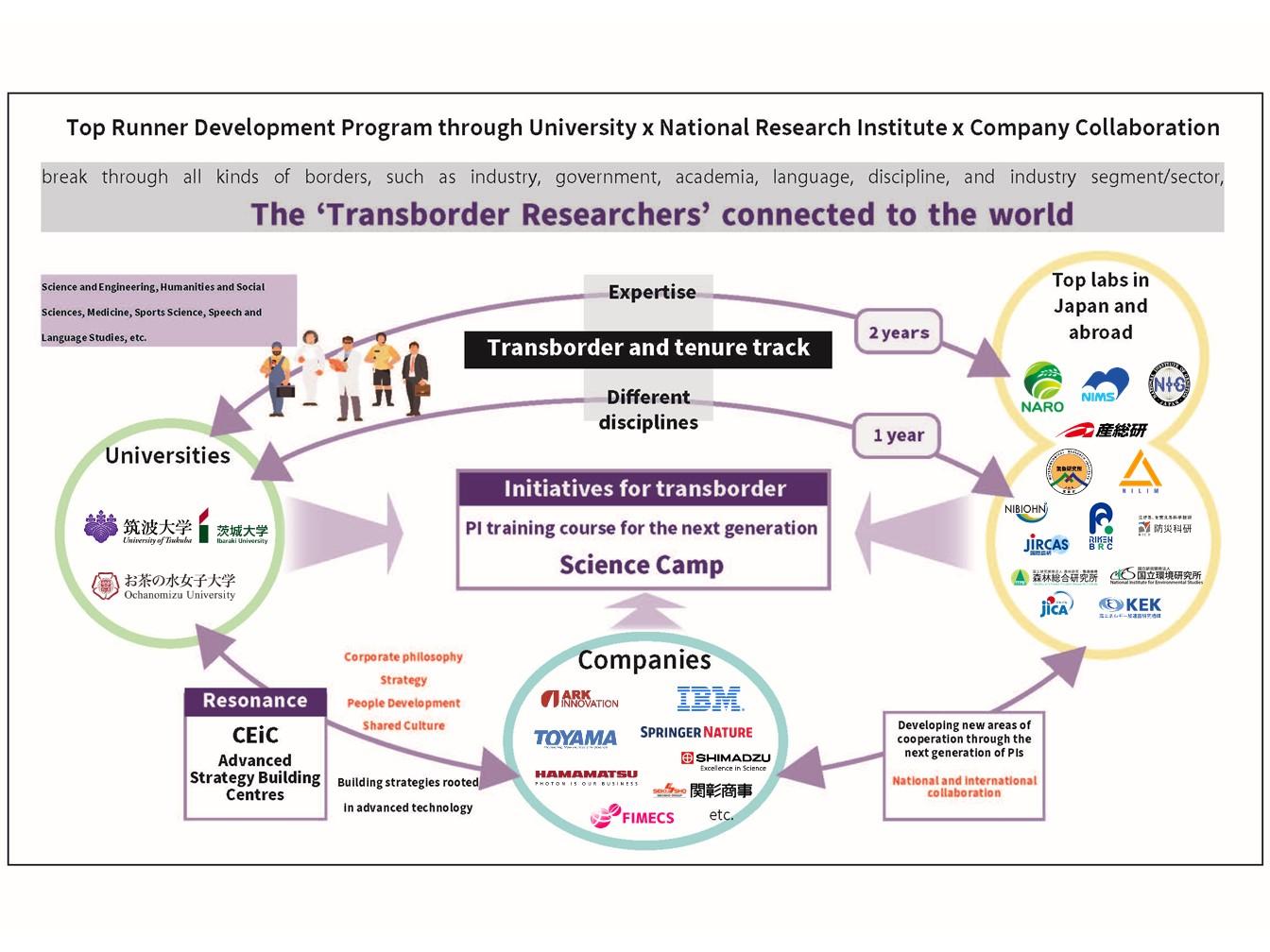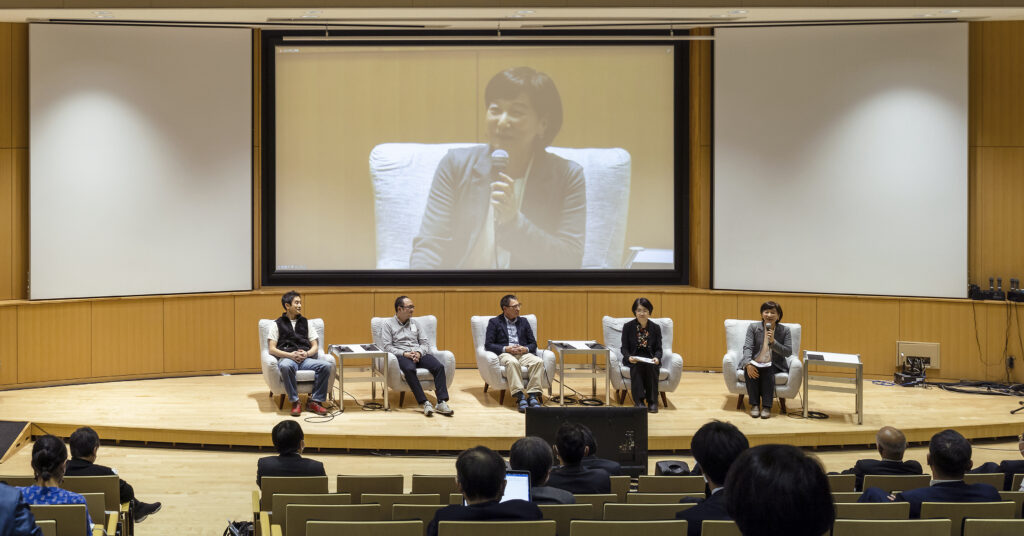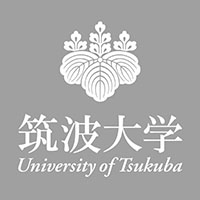[ad_1]
Launch of the “Top Runner Development Program through University x National Research Institute x Company Collaboration” —The University of Tsukuba selected for the MEXT’s “Strategic Professional Development Program for Young Researchers”—
The University of Tsukuba has been selected for the FY2021 Grant-in-Aid Project for the Development of Human Resources in Science and Technology, “Strategic Professional Development Program for Young Researchers”*1 by the Ministry of Education, Culture, Sports, Science and Technology (MEXT). The University of Tsukuba is one of the five institutions that have been selected since FY2019 to implement the project.
This program aims to foster the next generation of ‘transborder researchers’ through collaboration among universities, national research institutes*2, and private companies.
Description of the program
The ‘transborder researchers’ that this program aims to foster are the next-generation of top runners who break through all kinds of borders, such as industry, government, academia, language, discipline, and industry segment/sector, and who possess:
1. The “ability to deepen expertise” to advance and deepen their research based on an original and cutting-edge research foundation with a long-term vision,
2. The “ability to see from a higher perspective” to derive co-creation with other disciplines/industries from the potential of their expertise, and
3. The “ability to transmit and manage” to expand their expertise and unite/lead the research groups.
In implementing this program, we will make the most of the strengths of Tsukuba Science City, which has one of the best research environments in Japan, to develop and demonstrate a world-leading development program that transcends the barriers between the humanities and sciences through collaboration among the universities, national research institutes, and companies. By building a systematic support system for transborder activities, and establishing a CEiC (Cutting-Edge in Campus) for companies and us to resonate on advanced technology and human resource development culture, we will implement initiatives to overcome challenges to strengthen Japan’s research capabilities, such as joining the world’s top researcher networks, promoting Diversity & Inclusion, and protecting and utilizing intellectual property as resources. Our efforts will gradually be expanded nationwide.
Reference
*1 Strategic Professional Development Program for Young Researchers
It is a project of the Ministry of Education, Culture, Sports, Science and Technology (MEXT) aimed to contribute to the enhancement of Japan’s science and technology innovation and research capabilities. It supports universities and research institutions that promote the strategic development of outstanding researchers through the development of programs to foster human resources for world’s top-class researchers who work beyond the boundaries of industry and academia and through a systematic researcher development system.
(Reference URL: https://www.jst.go.jp/innov-jinzai/sekai/en/index.html)
*2 National research institutes
Public research institutes such as National Research and Development Agencies, Inter-University Research Institute Corporations, other research institutes of ministries and independent administrative corporations here are referred to as “national research institutes”.

Implementation system of project
Comments from concerned parties
Nagata Kyosuke, President, University of Tsukuba
The University of Tsukuba was the first university in Japan to introduce the Western tenure-track system in 1994, and has since been improving the system to strengthen the research capabilities of young researchers.
In this program, we will make a leap forward to develop transborder human resources that transcend the boundaries among universities, national research institutes, and companies, as well as the disciplinary boundaries, by utilizing the achievements of our unique international tenure-track system and the efforts described above.
Wada Hiroshi, Vice President and Executive Director for Research, University of Tsukuba
We are being asked a question: what will the Earth be like when we pass it on to future generations in 50 or 100 years? In this project, universities, national research institutes, and companies will work together to provide systematic support for young researchers, who are entrusted with the future of the Earth, in the process of their development as PIs.
Umemura Masayuki, Prospective Program Manager (PM)/Professor, University of Tsukuba
This program aims to develop ‘transborder researchers’ who are able to derive co-creation with other fields from the potential of their own fields and lead new research trends while deepening their own expertise. This program has been selected in ‘Divine Timing’. With the ‘Geographical Advantage’ of the Tsukuba region and the ‘Harmony among People’ through close collaboration among universities, national research institutes, and companies, we will make every effort to develop young transborder human resources who will lead the next generation.
Konno Mitsuru, Vice President for Research/Industry-University-Government Collaboration, Ibaraki University
With concerns over the decline in Japan’s capabilities in science and technology, it is the mission of national universities to develop excellent researchers who will lead the future. Through this project, Ibaraki University will solidly foster young faculty members who will join the world’s top-class research community and open up new frontiers in science.
Morita Ikuo, Trustee, Vice President, Ochanomizu University
Ochanomizu University has a long history of fostering global female leaders who can play active roles in the world. Based on this mission and emphasis on diversity and inclusion as the foundations of our educational philosophy, we will continue our efforts in this project to develop researchers who can enhance not only IQ but EQ as well.
Sato Kazuhiko, Director, Interdisciplinary Research Center for Catalytic Chemistry, National Institute of Advanced Industrial Science and Technology (AIST)
In participating in this project for the strategic development of world-class researchers, we will cooperate with the University of Tsukuba and other institutions for the smooth promotion of the project and human resource development.
Mizumachi Koko, Vice-President, National Agriculture and Food Research Organization (NARO)
In this project, we will work together with the University of Tsukuba and other organizations involved in this project to promote the development program.
We will also contribute to expand this program in other part of Japan, because we have research bases not only in the Tsukuba area but also in other parts of Japan.
Hono Kazuhiro, Executive Vice President, National Institute for Materials Science (NIMS)
We have been cooperating with the University of Tsukuba in fostering doctoral students through the Cooperative Graduate School Program, and we are pleased to participate in this project to develop world-class researchers.
Hanaoka Fumio, Director-General, National Institute of Genetics (NIG)
We are truly honored to participate in this project. We will make every effort to foster ‘transborder researchers connected to the world’, which the University of Tsukuba aims for, through our unique science English education program ‘NIG Method’.
Inoue Kiyoshi, President & CEO, ARK INNOVATION
We are planning to invite talented researchers with high potential to join us at the forefront of strategy building of global companies and promising ventures. We are very honored to play a part in the career development of top researchers capable of changing the world.
Okamoto Shunichi, Director and Managing Executive Officer of the Wellbeing Division at Sekisho Corporation
We are very honored to have the opportunity to work with the University of Tsukuba on this project.
As a company that develops businesses in our hometown of Tsukuba, we hope to utilize our strengths to give back to our community.
Endo Katsumi, Chief Executive Officer, Toyama
In order for researchers to make a great achievement in the world, we wish them to go out to the field with their own feet and cultivate a sensibility to discern the genuine.
From that kind of view, TOYAMA, which develops experimental verification equipment for cutting-edge science and technology, has confidence that they can get valuable experiences on our field, with us.
Contact
University of Tsukuba Research Administration/Management Office
(Shindo M., Kato H., Toba G., Chen C., and Morimoto Y.)
1-1-1 Tennodai, Tsukuba, Ibaraki 305-8577 Japan
E-mail: transborder-leaders#@#un.tsukuba.ac.jp
(Please substitute “#@#” with “@”.)
Tel: +81 (0)29-853-4545
[ad_2]
Source link





![[Sign up by July 29] 2022 Saitama City Comprehensive Disaster Prevention Training Fair [Sign up by July 29] 2022 Saitama City Comprehensive Disaster Prevention Training Fair](http://en.saitama-u.ac.jp/wp-content/uploads/2022/06/Disaster-Prevention-Training-Fair_page-0001-e1656561113802.jpg)















